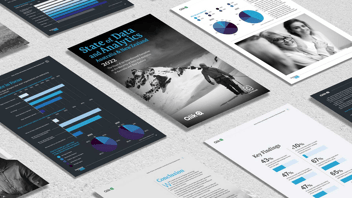Jennifer Deprez: Transforming Data into Business Gold

Air New Zealand’s Senior Data Governance Specialist, Jennifer Deprez, spoke to Corinium APAC Conference Director Maddie Abe about innovation in data architecture and its significance as a strong business enabler and differentiator.
Innovative data architecture is paramount for maintaining a competitive edge. A robust architecture not only swiftly integrates and presents trusted data to decision-makers but also empowers self-service functionalities and facilitates diverse business use cases.
“We have access to information that we never imagined at an amazing pace," says Jennifer Deprez, Senior Data Governance Specialist at Air New Zealand, the flag carrier of New Zealand.
"The ability for a robust data architecture to be able to integrate and present trusted data and on the screens of decision-makers faster helps secure advantage.
"Data architects must grasp various business use cases including but not limited to enabling self-service."
Given the rapid pace of technological evolution, it's imperative for data architecture to foresee forthcoming requirements. This involves early consideration of integration and interoperability to accommodate future growth.
“Data architecture should consider the entire data ecosystem. This consideration is important as undoubtably an organisation will grow to be hybrid or multi-cloud over time,” Deprez says.
“Businesses will continue to find tools that help them perform their functions faster and the data architecture needs to be flexible enough to accommodate these changes. Ensuring easy integration and interoperability helps support this agility allowing businesses to respond to changing market landscape.”
Discussing successful implementations where innovative data architecture has driven business growth and resilience, Deprez emphasised the importance of minimising lift and shift especially when considering analytics environments and analytic capabilities on the journey to the cloud.
"This approach led to significant advantages, including a re-assessment of some of our key metrics based on the current state of the business, rather than replicating outdated practices from the previous decades,” she says.
“This initiative drove business growth by providing key stakeholders with a deeper understanding of their data, how they were being measured and how to influence those metrics. By rearchitecting some of this instead of simply migrating, the business made significant strides forward leveraging the benefits of the cloud while also increasing their data literacy to ensure relevance."
Mindset Shift
Underlining the crucial need for a paradigm shift towards embracing change and agility in data architecture practices, Deprez underscored the significance of advocating for a business-centric understanding of data architecture
"It is important to remember that a robust flexible data architecture will also drive business agility. Both work together and this is an exciting prospect, knowing that your solution can provide information about how the business might need to adapt by providing reliable, fresh data that is understood by business," she says.
Deprez added that addressing strategies for fostering a culture of innovation and adaptability within the organisation cannot be overstated.
“Let's celebrate the learnings! Often, we focus on celebrating the completion of a project and overlook the valuable insights gained throughout the journey,” she says.
“By assembling teams with varied perspectives, skills, and interests, we ensure that all voices are heard. Establishing trust and stability within teams is essential for fostering diverse thinking.
“Everyone should be seen as a consumer or stakeholder of the data architecture in the broadest sense. This shifts the mindset to a way of working and culture change.
"Grounding innovation in the business's needs is vital. This approach permeates the organisation with a culture of innovation, making it adaptable to technological changes and aligning technology innovation with meaningful, tangible outcomes.
Innovative Data Architecture
Reflecting on her experience serving as the Director of Data Management at Canada’s largest community lab overseeing Data Analytics, Data Operations, Data Governance, Integration and Architecture, Deprez believes modernisation of systems so that information is presented to people faster has tremendous impacts.
“By modernising much of the analytics for the patient service centres we were able to help them schedule staff based on their specific locations no no-show rates for appointments,” she says.
“Previously they received this information every week, would report and make recommendations based on their recollection of events.
Working on a data and technology architecture to capture key pieces of information, they were now able to see this information hourly of cancellations, determine trending of no shows and try schedule adjustments based on that to optimise the staff utilisation."
Deprez also highlights the shift in operational approach from individual isolation to collaborative networking among centres, which fundamentally changed how they functioned.
“We developed tools so that information between the patient service centres and outages/closures were shared. This allowed for notifications to be shared by patient service centres for the influx of possible shifting of patients that receiving centres now had advance notice to plan for.“
Looking Ahead
Striking a balance between innovation and the imperatives of security and compliance in data practices, Deprez believes that leveraging automated metadata for security and compliance creates pathways for rapid innovation.
“If these things are determined early, it becomes part of the way that work is done that supports the needs of these two areas that are often seen in conflict. I believe it is also important to align the requirements of security, compliance, and governance with business goals," she says.
Considering the rapid pace of technological advancements and the increasing complexity of data ecosystems, Deprez envisions the role of data architecture evolving in the next decade.
“The transition to decentralised models of working with data will add more requirements around data architecture about being repeatable, reusable, automated governance, and adaptive practices.
“I believe that there will be a higher focus on metadata and how to use it to support this. Focus on metadata also helps with future AI use cases.”
Jennifer Deprez will be speaking at Data Architecture New Zealand this April. To learn more and register your place, visit this link!



